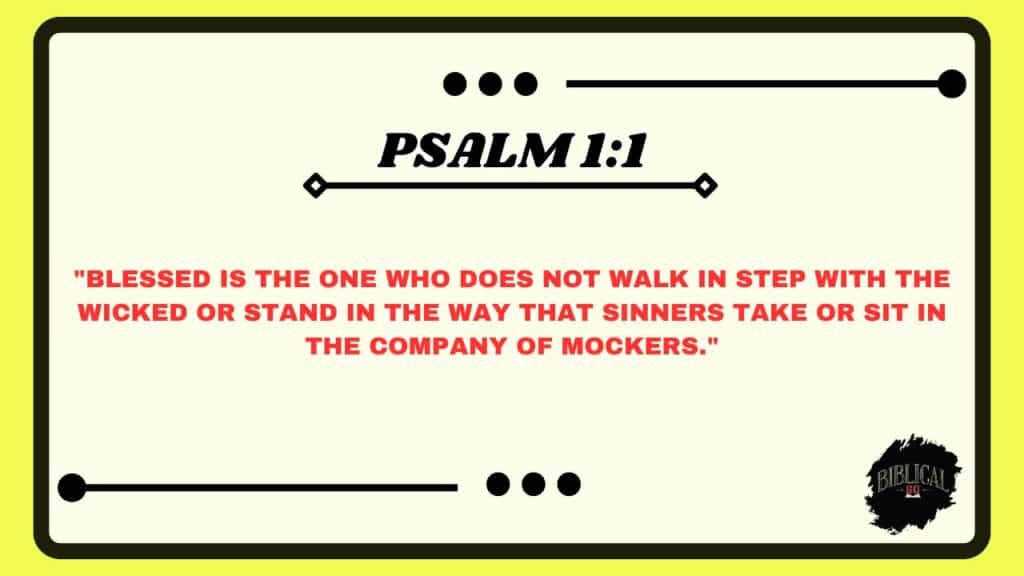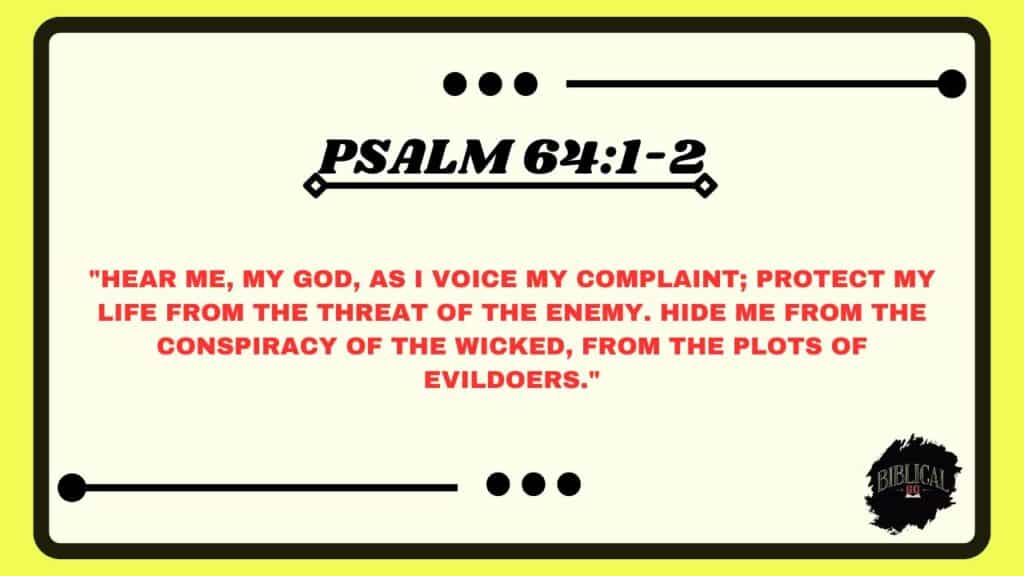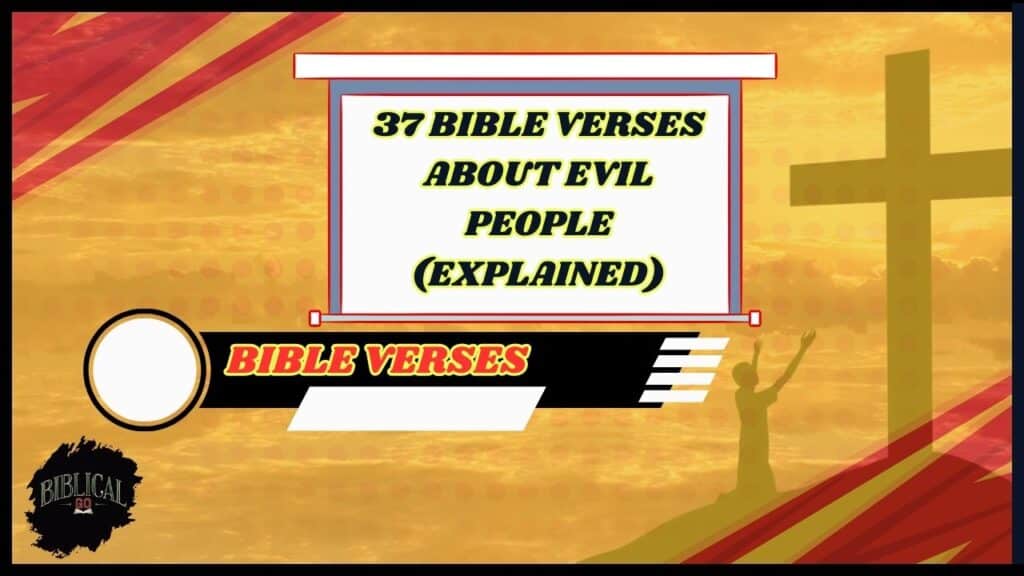Bible Verses About Evil People: In a world where we regularly encounter wickedness and malice, Scripture provides wisdom for recognizing, responding to, and remaining steadfast against evil influences. The Bible doesn’t shy away from addressing the reality of evil people and their actions, offering divine guidance on how believers should navigate these challenging relationships and situations.
God’s Word equips us with discernment to identify evil, instructions for responding with wisdom rather than vengeance, and promises of divine justice that allow us to maintain our peace. These verses remind us that while we may face opposition from those who choose darkness, we are called to stand firm in righteousness without becoming embittered or corrupted ourselves.
Understanding what Scripture teaches about evil people helps us maintain our spiritual integrity while navigating a fallen world with wisdom and grace.
Also Read: 36 Bible Verses About Missing Someone (Explained)
Recognizing Evil People and Their Ways
Proverbs 6:12-14
“A troublemaker and a villain, who goes about with a corrupt mouth, who winks maliciously with his eye, signals with his feet and motions with his fingers, who plots evil with deceit in his heart he always stirs up conflict.”
This passage provides a clear portrait of a deceitful person who delights in causing trouble. Solomon describes how evil people often communicate and operate through subtle signals and dishonest speech. Remember this description when you notice someone consistently creating division and using manipulation tactics.
Psalm 36:1-4
“I have a message from God in my heart concerning the sinfulness of the wicked: There is no fear of God before their eyes. In their own eyes they flatter themselves too much to detect or hate their sin. The words of their mouths are wicked and deceitful; they fail to act wisely or do good. Even on their beds they plot evil; they commit themselves to a sinful course and do not reject what is wrong.”
This psalm reveals the mindset behind evil actions self-deception, lack of reverence for God, and continuous planning of wrongdoing. When you encounter someone who shows no remorse for harmful actions and continues planning evil, recognize this pattern as described in Scripture and maintain appropriate boundaries.
Matthew 7:15-16
“Watch out for false prophets. They come to you in sheep’s clothing, but inwardly they are ferocious wolves. By their fruit you will recognize them. Do people pick grapes from thornbushes, or figs from thistles?”

Jesus warns about those who present themselves as righteous while harboring evil intentions. The key to discernment is examining the “fruit” or outcomes of someone’s life and teachings. Apply this principle by evaluating patterns of behavior rather than isolated actions or persuasive words when determining someone’s character.
2 Timothy 3:1-5
“But mark this: There will be terrible times in the last days. People will be lovers of themselves, lovers of money, boastful, proud, abusive, disobedient to their parents, ungrateful, unholy, without love, unforgiving, slanderous, without self-control, brutal, not lovers of the good, treacherous, rash, conceited, lovers of pleasure rather than lovers of God having a form of godliness but denying its power. Have nothing to do with such people.”
Paul catalogs characteristics of evil people who may even maintain religious appearances. This comprehensive list helps us identify dangerous character traits that often cluster together. When you observe multiple warning signs from this list in someone’s behavior, exercise caution and consider limiting your interaction as Paul advises.
Also Read: 33 Bible Verses About Being Lukewarm
Responding to Evil People with Wisdom
Romans 12:17-21
“Do not repay anyone evil for evil. Be careful to do what is right in the eyes of everyone. If it is possible, as far as it depends on you, live at peace with everyone. Do not take revenge, my dear friends, but leave room for God’s wrath, for it is written: ‘It is mine to avenge; I will repay,’ says the Lord. On the contrary: ‘If your enemy is hungry, feed him; if he is thirsty, give him something to drink. In doing this, you will heap burning coals on his head.’ Do not be overcome by evil, but overcome evil with good.”
Paul provides the foundational Christian response to evil people refusing retaliation and choosing good instead. This doesn’t mean becoming a doormat but rather maintaining your moral integrity while trusting God with justice. Practice this by intentionally blessing those who mistreat you, not to manipulate them, but to remain true to Christ’s example.
Matthew 5:44-45
“But I tell you, love your enemies and pray for those who persecute you, that you may be children of your Father in heaven. He causes his sun to rise on the evil and the good, and sends rain on the righteous and the unrighteous.”
Jesus gives perhaps the most challenging command regarding evil people to love and pray for them. This supernatural response distinguishes Christian character from worldly reactions. Begin implementing this teaching by regularly praying for those who harm you, asking God to work in their lives and transform their hearts.
Proverbs 24:19-20
“Do not fret because of evildoers or be envious of the wicked, for the evildoer has no future hope, and the lamp of the wicked will be snuffed out.”
Solomon warns against becoming emotionally entangled with evil people through worry or envy. Their prosperity is temporary and meaningless. When tempted to obsess over the apparent success of those who do wrong, redirect your focus to eternal values and God’s ultimate justice.
Ephesians 5:11
“Have nothing to do with the fruitless deeds of darkness, but rather expose them.”
Paul instructs believers to maintain clear separation from evil actions while courageously standing for truth. This balanced approach prevents both compromise and silence in the face of wrongdoing. Apply this by refusing to participate in harmful behaviors while speaking truth with grace when appropriate.
Psalm 1:1
“Blessed is the one who does not walk in step with the wicked or stand in the way that sinners take or sit in the company of mockers.”

This psalm describes progressive involvement with evil influences walking, standing, then sitting showing how casual association can lead to deeper entanglement. Protect yourself by being intentional about your closest associations and the voices you regularly expose yourself to.
Protecting Yourself from Evil Influence
1 Corinthians 15:33
“Do not be misled: ‘Bad company corrupts good character.'”
Paul quotes a well-known proverb to remind believers that our associations shape our character over time. This straightforward warning emphasizes the importance of wise relationship choices. Evaluate your closest relationships and consider whether they strengthen or weaken your commitment to godly values.
Proverbs 13:20
“Walk with the wise and become wise, for a companion of fools suffers harm.”
This proverb offers both the negative consequence of harmful associations and the positive benefit of wise companionship. Our development is significantly influenced by who we spend time with. Intentionally seek mentors and friends whose wisdom and character you admire, while limiting time with those who demonstrate foolish patterns.
2 Corinthians 6:14
“Do not be yoked together with unbelievers. For what do righteousness and wickedness have in common? Or what fellowship can light have with darkness?
Paul uses agricultural imagery to warn against forming binding partnerships with those who reject God’s ways. This applies particularly to major life commitments like marriage and business partnerships. When making significant life decisions, consider whether your potential partner shares your core values and spiritual commitments.
Proverbs 4:14-15
“Do not set foot on the path of the wicked or walk in the way of evildoers. Avoid it, do not travel on it; turn from it and go on your way.”
This passage advises complete avoidance of paths that lead to evil. It emphasizes proactive decision-making rather than seeing how close we can get to wrongdoing. Practice this by identifying situations and environments that tend to compromise your values and creating clear boundaries around them.
Psalm 26:4-5
“I do not sit with the deceitful, nor do I associate with hypocrites. I abhor the assembly of evildoers and refuse to sit with the wicked.”
The psalmist describes his intentional separation from those who practice deceit and wickedness. This isn’t about self-righteousness but about protecting spiritual integrity. Consider whether certain social groups or gatherings consistently pull you away from your values, and be willing to make difficult choices about your participation.
Also Read: 37 Bible Verses About Dreams Coming True
Understanding God’s Justice Toward Evil
Psalm 37:1-2
“Do not fret because of those who are evil or be envious of those who do wrong; for like the grass they will soon wither, like green plants they will soon die away.”
David reminds us that wickedness is temporary despite appearances of prosperity. This perspective helps us maintain patience when evil seems to flourish. When discouraged by the success of those who do wrong, remember the brevity of life and the eternal perspective that ultimately matters.
Proverbs 11:21
“Be sure of this: The wicked will not go unpunished, but those who are righteous will go free.”
This proverb affirms God’s ultimate justice evil will face consequences while righteousness receives vindication. This divine promise allows us to release our need for personal vengeance. Trust in God’s perfect justice when you feel the urge to “set things right” through your own retribution.
Psalm 34:16
“The face of the LORD is against those who do evil, to blot out their name from the earth.”
David describes God’s active opposition to evil, not mere passive disapproval. This sobering reality should inspire both reverence and comfort. Remember in times of victimization that God sees evil acts committed against you and stands in opposition to your oppressors.
Isaiah 13:11
“I will punish the world for its evil, the wicked for their sins. I will put an end to the arrogance of the haughty and will humble the pride of the ruthless.”

This prophetic declaration assures that arrogance and ruthlessness will ultimately be humbled by divine intervention. God’s justice extends to every form of evil. When feeling overwhelmed by widespread corruption or powerful wrongdoers, remember that no evil is beyond God’s notice or judgment.
Romans 2:6-8
“God ‘will repay each person according to what they have done.’ To those who by persistence in doing good seek glory, honor and immortality, he will give eternal life. But for those who are self-seeking and who reject the truth and follow evil, there will be wrath and anger.”
Paul explains how God’s judgment operates according to our ongoing patterns of choice, not isolated incidents. This reminds us that life direction matters immensely. Focus on developing patterns of righteousness in your own life rather than obsessing over evil in others.
Maintaining Your Spiritual Integrity
Romans 12:9
“Love must be sincere. Hate what is evil; cling to what is good.”
Paul provides a balanced approach to evil genuine love coupled with clear moral discernment. This prevents confusing love with moral compromise. Practice identifying specific evils you need to reject while actively pursuing what is good, beautiful, and true.
Psalm 97:10
“Let those who love the LORD hate evil, for he guards the lives of his faithful ones and delivers them from the hand of the wicked.”
This psalm connects proper hatred of evil with love for God, showing they are compatible rather than contradictory. God’s protection accompanies this righteous stance. Ask God to align your heart with His loving what He loves and hating what He hates while trusting in His safekeeping.
3 John 1:11
“Dear friend, do not imitate what is evil but what is good. Anyone who does what is good is from God. Anyone who does what is evil has not seen God.”
John presents a simple yet profound principle we reveal our spiritual nature by what we choose to imitate. Our behavior demonstrates our true connection to God. Look for godly examples to emulate in your community, and consciously reject patterns of behavior that contradict God’s character.
Proverbs 3:7
“Do not be wise in your own eyes; fear the LORD and shun evil.”
Solomon connects humility and reverence for God with the rejection of evil. Pride often blinds us to our own potential for wrongdoing. Practice regular self-examination before God, acknowledging your vulnerability to deception and your need for divine wisdom.
Psalm 119:101
“I have kept my feet from every evil path so that I might obey your word.”
The psalmist describes intentional avoidance of evil as a prerequisite for obedience to God’s word. The two disciplines work together. Create specific guardrails in your life that help you avoid situations where temptation is strongest, allowing God’s word to transform your heart and mind.
Also Read: 36 Bible Verses About Manifestation
Wisdom for Dealing with Evil People in Specific Situations
Proverbs 22:24-25
“Do not make friends with a hot-tempered person, do not associate with one easily angered, or you may learn their ways and get yourself ensnared.”
Solomon warns specifically against close relationships with those who struggle with anger management. Their emotional patterns can become contagious. If you must interact with quick-tempered people, maintain emotional boundaries and avoid absorbing their reactive patterns.
Titus 3:10-11
“Warn a divisive person once, and then warn them a second time. After that, have nothing to do with them. You may be sure that such people are warped and sinful; they are self-condemned.”
Paul provides specific instructions for handling those who consistently create division. Clear communication should precede distance. When dealing with someone who repeatedly sows discord despite correction, establish appropriate boundaries while leaving the door open for future reconciliation if genuine change occurs.
2 Timothy 2:23-24
“Don’t have anything to do with foolish and stupid arguments, because you know they produce quarrels. And the Lord’s servant must not be quarrelsome but must be kind to everyone, able to teach, not resentful.”
Paul advises avoiding pointless debates that lead nowhere while maintaining a teaching spirit. This balanced approach prevents both unnecessary conflict and compromised truth. When interacting with someone who loves argument for its own sake, redirect conversations toward substantive matters or politely disengage.
Proverbs 26:4-5
“Do not answer a fool according to his folly, or you yourself will be just like him. Answer a fool according to his folly, or he will be wise in his own eyes.”
This seemingly contradictory proverb actually provides situational wisdom sometimes responding to foolishness in kind only perpetuates it, while other times a strategic response exposes the folly. Discern whether engaging or withdrawing will better serve truth in each unique situation.
Matthew 18:15-17
“If your brother or sister sins, go and point out their fault, just between the two of you. If they listen to you, you have won them over. But if they will not listen, take one or two others along, so that ‘every matter may be established by the testimony of two or three witnesses.’ If they still refuse to listen, tell it to the church; and if they refuse to listen even to the church, treat them as you would a pagan or a tax collector.”
Jesus outlines a process for addressing sin within the community of faith, moving from private conversation to appropriate community involvement. This structured approach balances accountability with dignity. Follow these steps when addressing serious concerns with fellow believers, always with the goal of restoration rather than punishment.
Also Read: 37 Bible Verses About Mothers And Daughters (Explained)
Praying for Discernment and Protection
Psalm 140:1-2
“Rescue me, LORD, from evildoers; protect me from the violent, who devise evil plans in their hearts and stir up war every day.”
David models honest prayer for protection from those actively planning harm. This psalm acknowledges both the reality of evil intentions and our need for divine protection. Make specific prayer for discernment and protection a regular practice, especially when facing hostile situations.
Psalm 64:1-2
“Hear me, my God, as I voice my complaint; protect my life from the threat of the enemy. Hide me from the conspiracy of the wicked, from the plots of evildoers.”

The psalmist brings his concerns about wicked conspiracies directly to God rather than being consumed by fear. This demonstrates healthy dependence on divine protection. When aware of people plotting against you, channel your anxiety into prayer while taking reasonable precautions.
2 Thessalonians 3:2-3
“And pray that we may be delivered from wicked and evil people, for not everyone has faith. But the Lord is faithful, and he will strengthen you and protect you from the evil one.”
Paul connects protection from evil people with God’s faithfulness, showing that such prayer is appropriate for believers. This reminds us that spiritual battles underlie human conflicts. Recognize the spiritual dimension of opposition you face while trusting in God’s ability to strengthen and protect you.
Also Read; 37 Bible Verses About Thieves And Liars
Conclusion: Bible Verses About Evil People
These 37 Bible verses about evil people reveal God’s wisdom for navigating a world where wickedness exists alongside goodness. Scripture doesn’t pretend evil people don’t exist but equips us with discernment to recognize them, wisdom to respond appropriately, and assurance of God’s ultimate justice.
The biblical approach balances several truths: we must recognize evil without becoming paranoid, respond with wisdom without seeking revenge, protect ourselves without isolating completely, and trust God’s justice while maintaining our own integrity. This balanced perspective allows us to live with both realism and hope.
As you encounter difficult people and situations, return to these verses for guidance. Let them shape your discernment, inform your responses, and remind you that while evil is real, God’s goodness and justice will ultimately prevail.
Bonus: Practical Ways to Apply These Verses
- Create a prayer journal specifically for difficult relationships, recording both your struggles and instances where God has given you wisdom or protection.
- Memorize key verses about responding to evil, such as Romans 12:21 (“Do not be overcome by evil, but overcome evil with good”), to have them readily available in challenging moments.
- Form an accountability group with trusted believers who can help you process difficult situations and provide balanced perspective when you’re dealing with harmful people.
- Develop a personal “warning signs” list based on biblical descriptions of evil character, helping you recognize potential threats earlier.
- Practice spiritual disciplines like fasting and extended prayer when making major decisions about relationships with difficult people.
- Study biblical examples like David’s interactions with Saul or Jesus’ responses to the Pharisees to learn from their wisdom.
- Consider professional counseling when dealing with the aftermath of relationships with truly evil or abusive individuals, as healing often requires both spiritual and emotional support.
Frequently Asked Questions
How can I tell the difference between someone who is evil and someone who is just difficult?
Scripture points to patterns rather than isolated actions. Look for consistent traits like deliberate deception, joy in others’ suffering, absence of remorse, and calculated harm. Difficult people may be immature or wounded but typically show capacity for growth and remorse. Pray for discernment while observing long-term patterns rather than making quick judgments.
Does the Bible really tell us to love evil people? How is that possible?
Yes, Jesus commands loving enemies (Matthew 5:44), but biblical love isn’t warm feelings it’s choosing someone’s ultimate good regardless of feelings. This might involve praying for their transformation, treating them with dignity as image-bearers of God, or establishing boundaries that prevent further harm. We can love evil people without trusting them or enabling their behavior.
What if the evil person is a family member I can’t avoid?
Wisdom may look different with unavoidable relationships. Establish clear boundaries around specific behaviors while maintaining necessary contact. Develop support systems for after difficult interactions. Practice emotional detachment when appropriate without dehumanizing the person. Most importantly, maintain regular prayer both for your protection and their transformation.
Does forgiving evil people mean what they did wasn’t wrong?
No. Forgiveness acknowledges the reality of wrongdoing while releasing your right to revenge. It’s primarily for your freedom rather than their benefit. Forgiveness doesn’t eliminate consequences or require reconciliation when trust is broken. It’s a process of releasing resentment while maintaining appropriate boundaries and allowing God to handle justice.
How can churches better handle evil or abusive people in their midst?
Churches should balance grace with protection by establishing clear policies for addressing harmful behavior, training leaders in recognizing abuse patterns, creating reporting mechanisms, consulting qualified professionals when appropriate, prioritizing victim safety, and ensuring accountability for wrongdoers. Genuine repentance involves changed behavior over time, not merely emotional displays or promises.
Read more knowledgeable blogs on Biblical Go

Piper McMillan is a devoted writer and Bible enthusiast, offering insightful guides on Bible verses. Her blog provides practical interpretations and reflections, helping readers deepen their faith and understanding of Scripture through accessible and inspiring content.



